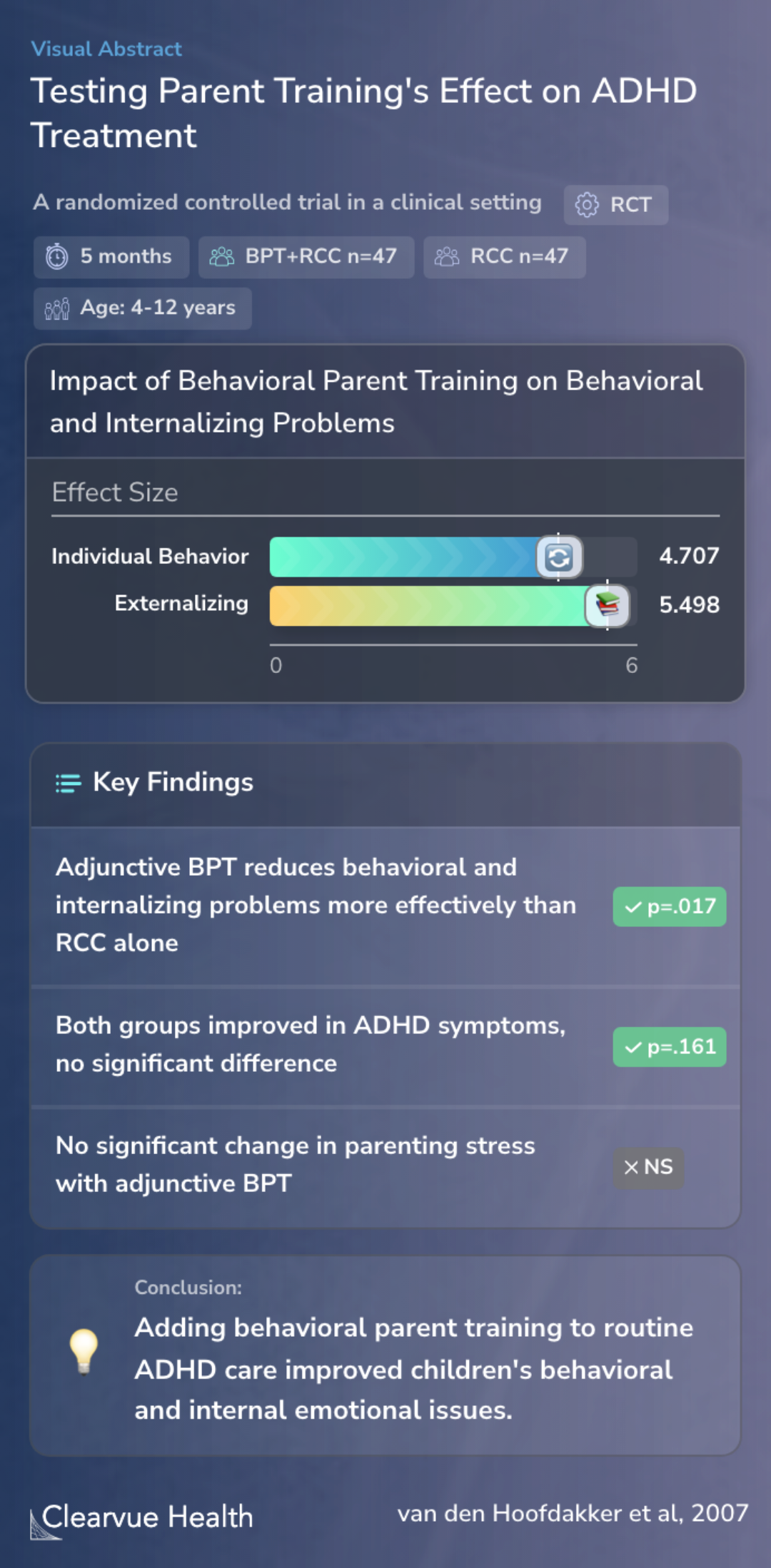Effectiveness of behavioral parent training for children with ADHD in routine clinical practice: a randomized controlled study
Testing Parent Training's Effect on ADHD Treatment
van den Hoofdakker BJ, van der Veen-Mulders L, Sytema S, Emmelkamp PMG, Minderaa RB, Nauta MH

Objectives
The study set out to look at how well a special program for parents, called behavioral parent training (BPT), works when it's added to the usual help that kids with ADHD get. This usual help is called routine clinical care (RCC).
To investigate the effectiveness of behavioral parent training (BPT) as adjunct to routine clinical care (RCC).
Methods
In this research, 94 kids between the ages of 4 and 12, all diagnosed with ADHD, were part of an experiment. They were attending a clinic in the Netherlands. These kids were divided into two groups. One group of 47 kids got the usual help plus the special parent program (BPT+RCC) for 5 months. The other group of 47 kids just continued with the usual help (RCC).
The parent program involved 12 meetings that lasted two hours each. In these meetings, groups of parents learned advanced skills to help their children, led by two psychologists. This included things like how to organize the house better, set clear rules, communicate effectively, and encourage good behavior. Parents also had homework where they practiced these skills and wrote about their experiences.
After a first phase of RCC, 94 children with attention-deficit/hyperactivity disorder (ADHD) ages 4-12, all referred to a Dutch outpatient mental health clinic, were randomly assigned to 5 months of BPT plus concurrent RCC (n = 47) or to 5 months of RCC (n = 47) alone. BPT consisted of 1...
Results
Over time, both groups of kids, those who got the parent program and those who didn't, showed improvement in their behavior. However, the kids whose parents took part in the program saw a bigger decrease in behavior problems and internal feelings of distress, making the program seem quite effective in these areas. The difference in improvement for behavior problems was significant, with a reduction of 4.7 points for individual behavior and 5.5 points for acting out behaviors compared to those who didn't get the program.
When it came to ADHD symptoms and how stressed parents felt, there wasn't a big difference between the two groups. This suggests that while the parent program helps with certain issues, it might not change everything. Also, kids who only got the usual care ended up needing more types of medicine than those in the parent program.
Both groups showed improvements over time on all measures. BPT + RCC was superior to RCC alone in reducing behavioral (p = .017) and internalizing (p = .042) problems. No outcome differences were found in ADHD symptoms (p = .161) and parenting stress (p = .643). These results were equal ...
Evidence Comparison
The study's results align with current evidence on ADHD treatment strategies. Behavioral therapy, such as parent training in behavior management (PTBM), is a key component of ADHD management, particularly for preschool-aged children. The study found that adding behavioral parent training (BPT) to routine clinical care (RCC) led to greater improvements in children's behavioral and internalizing problems compared to RCC alone. This reinforces the importance of incorporating behavioral interventions alongside medication and other supports in the treatment of ADHD
While the study did not find significant differences in ADHD symptoms or parenting stress between the BPT + RCC and RCC-only groups, the improvements in behavioral and internalizing problems underscore the value of a comprehensive treatment approach. This aligns with the chronic management perspective in ADHD treatment, which emphasizes ongoing coordination between healthcare providers, schools, and families to address the multifaceted challenges associated with the disorder.
Conclusions
Adding behavioral parent training to routine ADHD care improved children's behavioral and emotional issues, but didn't make much difference in ADHD symptoms or parenting stress. It also reduced the need to use lots of different medications. This shows that extra behavioral training for parents can boost the effects of regular ADHD treatment, especially for behavioral and emotional problems. However, it might not be as helpful for core ADHD symptoms or making parenting feel less stressful.
Adjunctive BPT enhances the effectiveness of routine treatment of children with ADHD, particularly in decreasing behavioral and internalizing problems, but not in reducing ADHD symptoms or parenting stress. Furthermore, adjunctive BPT may limit the prescription of polypharmaceutical trea...
Key Takeaways
Context
The study above looked at whether adding social skills training to ADHD medication helps kids make friends better. They found that the extra training didn't really improve social skills compared to just medication alone. It suggests that for many children with ADHD, medication on its own might be enough to help with social functioning, without needing separate social skills training.
Another study compared two different parent training programs, the New Forest Parenting Package (NFPP) and Helping the Noncompliant Child (HNC), for treating ADHD in preschool-aged kids. Both programs led to parent-reported improvements in ADHD behaviors and parenting, but teachers didn't notice the same changes, raising questions about how well the effects carry over to other settings. Together, these studies highlight the potential benefits and limitations of adding parent training to ADHD care.